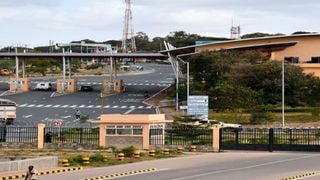
Moyale-Ethiopia One-Stop Border Point in this picture taken on August 18, 2021.
| Jacob Walter | Nation Media GroupNews
Premium
Why Kenyan traders are fleeing to Ethiopia
What you need to know:
- Kenya has continually failed to prop up its economy as it faces uneven growth of business and investment on the border due to unfavourable trade terms.
- In previous years, Ethiopia heavily relied on Kenya for glass and plastic bottles for their beer and bottled water but they no longer need to import them.
Traders are fleeing the formerly flourishing Moyale-Ethiopia border regions and are regaining confidence in the emerging-market assets in Ethiopia
Ethiopia’s efforts to reorient its economy to attract more investors are said to have prompted several investors with bases in Kenya to shift to Ethiopia.
The Kenya National Chamber of Commerce and Industry Moyale chapter official Ahmed Ali told Nation.Africa that Ethiopia’s efforts to create a conducive investment environment is a magnet for investors.
“It’s so unfortunate that Ethiopia, which previously heavily relied on Kenya for several products, has now become an exporter of the same products to Kenya,” Mr Ali said.
He attributed the shift to traders’ preference for cost-effective markets devoid of bureaucracies, high taxes and corruption.
He said there was growing anxiety among the local business community over the deepening investment and business paralysis along the Moyale-Ethiopia border.
Kenya has continually failed to prop up its economy as it faces uneven growth of business and investment on the border due to unfavourable trade terms.
For instance, in previous years, Ethiopia heavily relied on Kenya for glass and plastic bottles for their beer and bottled water but they no longer need to import them.
They also relied on Kenya for cement, aluminium products, soap, lubricants, waxes, candles, modelling pastes, inorganic chemicals and precious metal compounds and others.
But Ethiopia wooed investors from China and Europe to set up factories to produce such products in the country.
Mr Ali and other local business people warned that if Kenya did not create a better trading environment between her and Ethiopia, it would be the loser.
They appealed to the Kenyan authorities to assess the status of bilateral trade between Ethiopia and Kenya in order to keep investors from fleeing investors.
Moyale businessman Mohammed Isack, for his part, observed that the business slowdown along the Kenya-Ethiopia border could add to economic headwinds already facing the two trading partners.
Making the trading environment favourable by reducing tax and customs duty, he suggested, will raise demand for goods once again.
“Ethiopia is beating Kenya at her game because they’ve realised that investors can only be attracted through a favourable trade environment with less corruption and bureaucracy,” Mr Isack said.
Investors, he said, are searching for higher returns, cost-effective asset markets and a bureaucracy-free environment.
The Ethiopian asset market has also attracted investors because of the incentives the federal government gives to its citizens and others in order to encourage more investments.
jwalter@ke.nationmedia.com


